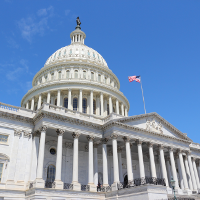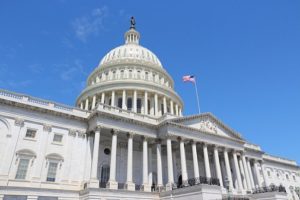The following post comes from Liz Velander, a recent graduate of Scalia Law and a Research Assistant at CPIP.
 By Liz Velander
By Liz Velander
In mid-December, the Senate Intellectual Property Subcommittee, led by its Chairman, Senator Thom Tillis (R-NC), held a hearing entitled “The Role of Private Agreements and Existing Technology in Curbing Online Piracy.” The hearing came ahead of Sen. Tillis’s release of his first discussion draft of legislation to reform the Digital Millennium Copyright Act (DMCA). In his opening remarks, Sen. Tillis stated that reforming the DMCA is one of his top priorities in the 117th Congress, but it may take his entire second term to get a DMCA reform bill across the finish line. The purpose of the hearing was to identify voluntary steps that copyright owners and tech companies can take now to curb online infringement.
The hearing consisted of two panels. Panel I included: Ruth Vitale, CEO, CreativeFuture; Probir Mehta, Head of Global Intellectual Property and Trade Policy, Facebook, Inc.; Mitch Glazier, Chairman and CEO, Recording Industry Association of America (RIAA); and Joshua Lamel, Executive Director, Re:Create. Panel II included: Katherine Oyama, Global Director of Business Public Policy, YouTube; Keith Kupferschmid, CEO, Copyright Alliance; Noah Becker, President and Co-Founder, AdRev; and Dean Marks, Executive Director and Legal Counsel, Coalition for Online Accountability.
Sen. Tillis began the hearing by voicing his opinion on the matter, informed by a year-long series of hearings and months of feedback from creators, user groups, and technology companies. “There is absolutely more big tech can and should do to stop online piracy,” Sen. Tillis said. “Unfortunately, it seems that some in big tech aren’t serious about stopping online piracy, and I don’t know why that is. Maybe it isn’t a priority—or maybe some companies are actually profiting off the piracy on their site. It is clear as day to me that many multi-national, multi-billion-dollar companies simply aren’t using all the tools they have to stop theft from small creators. And that’s wrong.”
Mitch Glazier, Chairman and CEO of RIAA, stated that the problem is that big tech companies aren’t properly incentivized to take steps in combatting online piracy. Keith Kupferschmid, CEO of the Copyright Alliance, explained that Section 512 of the DMCA has been so misinterpreted by the courts that most service providers know that they have little risk of liability and need only do the absolute minimum required under the DMCA to avoid liability.
Mr. Glazier said that one of the most important things Congress can do is to provide the right incentives to encourage voluntary private agreements. He explained that there are two types of private agreements. First, there are individual agreements entered into by copyright owners and technology providers. These can be nimble and evolve with technology. Second, there are standards developed in the marketplace that eventually achieve broad enough consensus and use that they become required. In Mr. Glazier’s view, that is what the DMCA contemplated—a multi-stakeholder standard technical measure (STM) process where there was enough consensus and use that it would be unfair for outliers to compete without using them. Mr. Glazier said that a voluntary system only works if there exist the right incentives, which the DMCA does not currently provide.
The panelists disagreed as to whether Congress needs to reform the DMCA in order to incentivize voluntary agreements. The panelists representing big tech companies asserted that the process is working as the DMCA intended, pointing to the policies and procedures of their platforms and existing content protection technology. Probir Mehta, Head of Global IP and Trade Policy at Facebook, touted Facebook’s content management tool, Rights Manager. Katherine Oyama, Global Director of Business Public Policy at YouTube, pointed to Youtube’s Copyright Management Tools, which include a webform, Content ID, and Copyright Match. These panelists emphasized the significant amount of work their companies undertook to create these technologies, which they view as going above and beyond the requirements of the DMCA.
Members of the IP Subcommittee were very interested to hear how these tools work in practice. Ruth Vitale, CEO of CreativeFuture, testified that most individual creators are not given access to YouTube’s Content ID, nor are they given an explanation for why they are denied. Ms. Oyama stated that while Content ID has eligibility requirements, YouTube built an entirely new tool for smaller creators, Copyright Match, which runs on Content ID itself. She claimed that Content ID is such a powerful tool that, if used improperly, will erroneously take down content that is noninfringing.
Ranking Member Senator Chris Coons (D-DE) wanted to know what the panelists viewed as the path forward. Mr. Kupferschmid said that while voluntary agreements have a role, they cannot address everything. He emphasized that legislative action is appropriate in this circumstance because service providers are not being cooperative. Noah Becker, President and Co-Founder of AdRev, a digital rights management and media technology company, agreed with Mr. Kupferschmid. He explained his business’ revenue-sharing proposition is a better fit for copyright owners that do not want to use YouTube’s monetization tools. In addition to legislation, he explained that there should be some sort of support for the concept of a list of approved vendors, like AdRev, to be able to access copyright APIs on massive platforms. He urged that this would reduce the large cost and technology burden of accessing APIs, making takedowns more affordable for creators.
Sen. Tillis closed the hearing by stating that the parties need to engage with one another in order to avoid a potential legislative overreach. He said that the hearing showed that tech companies must do more to combat online piracy. Sen. Tillis stressed that they have the tools and resources but must find ways to get greater engagement and create voluntary paths to prevent Congress from paving less voluntary ones.
 By Liz Velander
By Liz Velander 